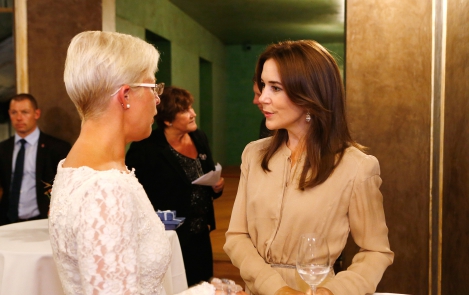-
Reset
+


Evelin Ilves: nutritional choices made in childhood determine our health in subsequent years
17.09.2014
Evelin Ilves, who was named as a health spokesperson on noncommunicable diseases by the European headquarters of the World Health Organization (WHO) this February, gave a speech at WHO's regional annual conference in Copenhagen at which she spoke about food and nutrition, the effects of nutrition on health and especially chronic disease.
She emphasised the importance of creating a healthy nutritional environment for children because: "We must see school lunches as an opportunity to develop the child's skills in making willing and unforced healthy food choices," Evelin Ilves told the representatives of more than 50 countries of WHO's European region in Copenhagen today.
She recalled her visits to several Estonian schools: "I have witnessed small country schools serving children fresh salad, locally sourced vegetables and meat, fresh fish and even bread baked on the spot for the same amount of money available to large city schools. At the same time, the same budget is used in many places to serve a pasta mash with industrial and reheated prefabricated meals."
According to Evelin Ilves, taking care of one's health does not mean choosing between healthy and unhealthy food alone; instead it requires constant healthy and balanced eating. The keys to making healthy choices are the will, ability and skill to prepare dishes from fresh ingredients. It is also important that the messages about healthy eating and healthy food that children receive at home, in kindergarten or in school complement each other.
"Children's nutritional choices begin at home," Evelin Ilves noted. According to her, it is not so rare to hear about cases where children, after attending an interesting cooking class or having a delicious school meal, will advise their parents on healthy eating and wish to cook with their families instead of buying ready-made food from a shop.
"Sometimes children learn faster, are more open and understand better. They know that health, eating and environment go together to form a whole. This is where we, as adults, should learn from children," Evelin Ilves said. "We are indeed what we eat. Food is not just fuel; it is part of culture, health and upbringing. Also, food is an important building block in the constant renewal of our physical bodies. The choices made in childhood determine our health in subsequent years and, therefore, our quality of life."
She recognised the call by the European Action Plan for Food and Nutrition to further bolster the health care system and place more emphasis on general practitioners to improve people's healthy eating habits and offer proficient information on the subject.
Evelin Ilves, who renewed her medical licence last year, agreed with WHO's opinion that the skills and knowledge of health specialists that would enable them to offer nutritional advice and lifestyle counselling in general are still not up to par and uneven in many countries, and debates over whether and to what extent the curricula of medical schools should contain courses on nutrition as a separate subject have continued for several years.
Health care is a political choice, stressed Evelin Ilves, in calling on WHO member states to contribute to developing the capabilities and skills of health specialists to create a modern network of health counselling that would truly help people. These activities require real contributions in terms of funds as well as time.
Office of the President
Public Relations Department
Phone +372 631 6229




